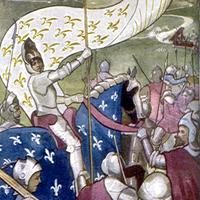50. A Great Awakening
"And the voices of the day Are heard across the voices of the dark. " —TENNYSON. Let us now gather up the threads of our story of the Middle Ages, and see how men's eyes were opened to all the beauty and the glory of the world around them. The Dark Ages had passed away for ever, the gloom of the fourteenth century would never return. The tide of barbarianism had swept over the smiling fields of Europe like a torrent of mud, quenching all life and joy.
But the seeds were still there; and as time passed on they were to spring up again through the mud, to become yet more beautiful, yet more glorious than they were before.
The world had been asleep, and now its time for awakening had come. Partly it came with Christianity. The Crusades showed the spirit that was spreading through Europe, as Christ became more and more a world power, and the eyes of men were turned to the Holy City away in distant Syria. The great empire of Rome had fallen, but a far grander empire of the world had arisen from its ashes.
As Dante began to sing, the world was "turning in its sleep." Its long slumber was disturbed by broken fragments of dream, by gleams of light, by voices in the night, bidding it throw off its world-fetters and venture forth into the radiance of the morning light.
One of the first to awake had been Prince Henry of Portugal. Over the Sea of Darkness he had shed a light, until the whole ocean was slowly revealed in the brightness of the day.
The awakening was slow. Gradually men ventured forth, until the Portuguese sailors had doubled the Cape of Good Hope and anchored their merchant fleets in the harbours of India, Columbus added a new world to the old, Magellan proved beyond dispute that the world was round.
Meanwhile Copernicus had discovered new wonders in the heavens, and the invention of printing had placed the new wonders in the hands of all. So this sudden contact with new wonders, new lands, and new creeds opened men's eyes to new and glorious possibilities. But there was something else which helped Europe to awake and claim her manhood again. Constantinople—the old capital of the East—had fallen into the hands of the Turks. This important city, away on the Golden Horn, had been the centre of learning for centuries, and there had been stored the masterpieces and art treasures of the old world. Now a general flight of her scholars, her artists, her poets, her philosophers, had to take place. And whither should they flee save to the shores of Italy, to the little city under the Tuscan hills, to the old home of Dante—Florence?
And so the poetry of Homer and the philosophy of Plato woke to life again in that little city by the river Arno, which was ever the home of learning and art. Here the great thoughts and writings of the Greeks were translated into other languages. The long silence of centuries was broken at last. The ships from Venice brought back manuscripts from the East as the most precious part of their cargo.
Scholars from Germany, England, France, flocked over the snowy Alps to learn Greek, so that they might carry back the new learning to their own countries.
"Greece has crossed the Alps," cried one, on hearing a Greek translation of one of the old masters read in Germany. "I have given up my whole soul to Greek learning," said Erasmus with enthusiasm; "and as soon as I get any money I shall buy Greek books, and then I shall buy some clothes. " So a new and joyous life took hold of Europe. Men had been bound and now they were free. "For the first time they opened their eyes and saw." And what they now saw was the beauty of the world, the glory of learning for learning's sake, the love of all that was good and noble on earth. Each man longed to write more beautiful poems, to paint more beautiful pictures, to build more beautiful houses; and this slow awakening of Europe is one of the most wonderful things in the world's history.

